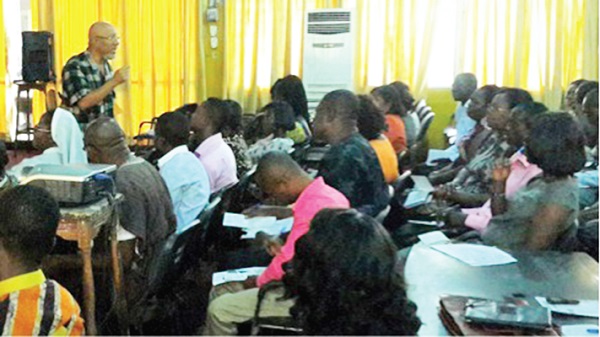
The self-fulfilling prophecy and the dangers of nasty hasty judgements
If teachers had the ability to read the minds of the children they teach, they would very likely hear the following: “My Maths teacher scolds me and tells the class I am good for nothing because I don’t understand divisions … My Science teacher says I am hopeless because I get low grades … My English teachers say I have no future because I can’t speak well like some of the others.”
One of the key takeaways from the Teacher Education Preparation (TEP) courses in my youth in the United States of America was the concept of “The Self-fulfilling Prophesy”. The course resonated with me on a personal level. From primary education in Ghana, I recalled how teachers told us off about our mistakes, errors of judgement, and folly. The insults that were unleashed cannot be repeated here in
Advertisement
The course defined self-fulfilling prophecy as “essentially a false or groundless expectation that comes true simply because it has been expected.” In the
Expectations in the classroom
Actually, two kinds of expectation effects can occur in classrooms. The first is “The Self-fulfilling Prophecy” (or the Pygmalion Effect) described above. In this
The second kind of expectation effect occurs when teachers are quite accurate in their positive estimates of student abilities and respond positively to those students.
It’s fine to form and act on predictions of students’ abilities. Many teachers tend to do this almost instinctively. The problems arise when students show some improvement but teachers do not alter their lower expectations to take account of the improvement. This is called “A Sustaining Expectation Effect”, for the reason that the teacher’s fixed expectation sustains the student’s achievement at the expected level.
Fred Swaniker shares an experience
Fred wrote that the family had just moved “from Ghana to
He asked, “First of all, why do schools even give exams in first grade? Children are just getting their feet wet as learners at that age! Second, how can a teacher write off a 5-year old who has just arrived from another country as having no hope in life? It was devastating to me.
“Fortunately, my mother didn’t believe what the teacher said. She knew there was more in me. She herself was a high school teacher, so she began tutoring me at home in English, and got me another tutor for mathematics. The next year, I came 5th in class. For the next several years, every time a teacher didn’t believe in me, she backed me fully and made sure I got the most challenging work at school.”
Eleven years later, Fred had moved to “Botswana and I had just taken the Cambridge O’ Level examinations. We waited for 3 months for the results to come in. When they did, I was shocked. I had received the top results in the history of Botswana (others have since met or exceeded my record). I later got a scholarship to study at Macalester College in the USA, where I graduated in the top 10 per- cent of the class and then to Stanford Business School - one of the top business schools in the world - where I again graduated in the top 10 per- cent of my class. And the rest is history. Who would have thought?”
Build the confidence of the African youth
He was forever grateful to his mother that the words of that teacher didn’t shake her belief in him, and said, “There are many challenges when it comes to unleashing the potential of young people in Africa. The educational system is broken,
He suggested that we need to propagate this ‘Can do’ mindset in our communities and institutions so we can bring out the best in young people. Young people with a growth mindset aren’t afraid to face new challenges and work on things they haven’t encountered before because they understand that failure is part of the learning process. Those who develop a fixed mindset are more likely to operate within their comfort zones because they’re too scared to fail.
The growth mindset, he concluded, is “something we’re working hard to infuse into the 3 million African leaders and entrepreneurs we're developing at African Leadership University, African Leadership Academy, and ALX, our new leadership accelerator for young university graduates and mid-career professionals.”
The writer is an educationist, a teacher, leadership coach and author



